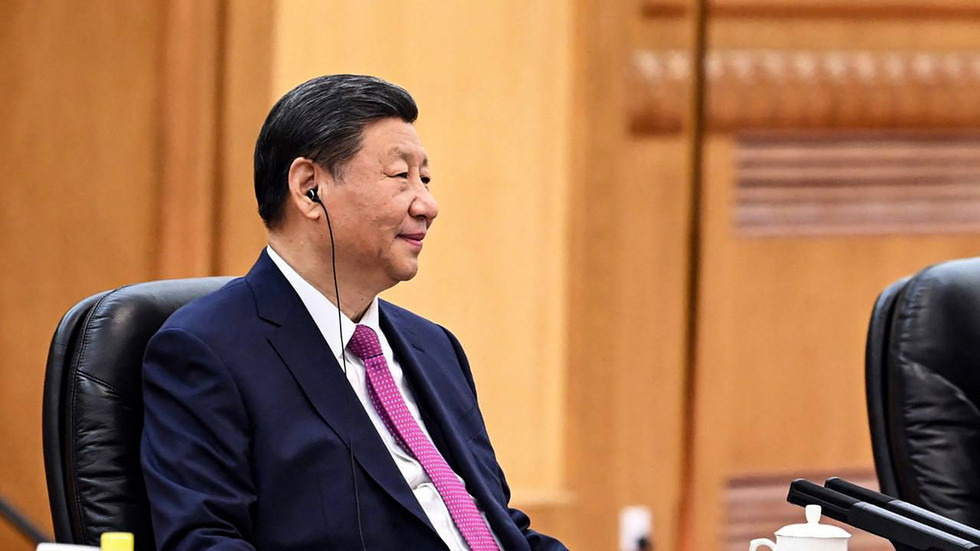
Media commentary gleefully proclaiming the end of China’s rise fail to take into account the global realities that Beijing is effectively adapting to
By Timur Fomenko, a political analyst
© Handout / Uzbek Presidential Press Service / AFP
If there’s one thoroughly unoriginal strand of thought on China present in the mainstream media today, it is the idea that China’s economy has been wrecked, and that Xi Jinping’s policies are to blame.
Such commentary, pushed by every major mainstream outlet on a weekly basis, frequently promotes a narrative of the “end” of China’s rise, often talks about “decline” and squarely places responsibility on Xi Jinping, who supposedly ended the dynamic of an open and prosperous China for increasingly centralized, authoritarian rule and a return to communist fundamentals.
Such an article was pushed this week by the editorial board of the Washington Post, in a piece titled “Xi is tanking China’s economy. That’s bad for the US”. The article was hardly original in its premise, stating the above argument pretty much word for word. When this argument is pushed, it always conveniently ignores the broader context that the world economy is in dire straits, and moreover the more pressing elephant in the room, that American foreign policy has been deliberately detrimental if not outright antagonistic to global economic prospects as a whole.
The idea of this narrative is to push the psychological warfare aspect that China is failing in order to dampen the optimism of businesses, undermine the Chinese economy and therefore push US foreign policy goals. This deliberately paints over the geopolitical, economic, and domestic considerations which have all driven a change in China’s own strategy and position. It is easy to denounce the “tyrannical rule of Xi Jinping” in a cliché and blame him for everything that has apparently gone wrong, but more difficult to paint an assessment as to why China’s internal and external environment today is not the same as it was ten years ago.
First, what is always, always ignored is that Xi Jinping deliberately set about changing the structure of China’s economy in order to end a growth boom based solely on real estate and debt. The newspapers love to waffle on about the “real estate crisis” and Evergrande, but can you imagine how big the problem would have been had previous policies been continued and China pushed for obscene 10% growth targets based on an explosion of debt? Xi Jinping ended this and initiated a process of deleveraging which deliberately slowed down China’s economic growth to around 6% when he came to power. Why? Because debt is not a sustainable mechanism and his policy has been literally to push the real estate industry into a managed recession, even if that has short-term repercussions.
Read more
Secondly, Xi Jinping’s policy has been to reinvent China’s economy to meet upcoming challenges by transforming it from a low end, export, real estate boom economy, into a high-end technological powerhouse. Instead of investing aimlessly in local government real estate booms, China has redirected state money to building up high-value industries including renewable energy, computing, semiconductors, automobiles, aviation, among other things. It is primarily this bid to become the global technological leader (by default of size) that has triggered the backlash from the US on an economic level and thus the bid to try and cripple China’s technological advance through export controls, which in fact show little evidence of working.
In addition to that, the global economic environment China operates in, has changed. The US has terminated its longstanding policy of open economic integration in favor of protectionism, bloc alignment, and the geopoliticization of supply chains. It has, in turn, created geopolitical conflicts with Russia and China and demanded its allies cut or reduce economic ties to the targeted countries. In doing so, the US has also attacked Beijing on a number of fronts using issues such as Xinjiang, Tibet, Taiwan and Hong Kong as weapons to smear China’s image, implement sanctions, and of course an all-embracing campaign of negative publicity to create uncertainty and destroy the optimism of China’s rise.
These policies inevitably have consequences on Beijing, which makes the country feel less secure, more suspicious, and therefore less open to the outside world. That isn’t as much a possible indictment of Xi Jinping as it is a structural reality of politics. The CIA for example, is relentless in trying to strengthen its presence in China, but if China arrests someone or links them to spying, the media will respond by calling Beijing paranoid, insecure and coercive, showing how the narrative will skewer the country no matter what. However, the point still remains that it is more challenging for China to grow in this environment than it was before. New challenges create new policies, and when the mainstream media pretend that Xi is the instigator of all the change and “spoiling” China’s chances, they are simply lying on multiple levels. It is a multifaceted psychological warfare campaign which opts for simple explanations rather than telling you the bigger picture of why China changed.
The statements, views and opinions expressed in this column are solely those of the author and do not necessarily represent those of RT.




